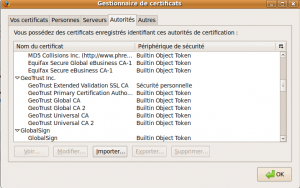Un petit mémo rapide pour installer signer ses messages (sortant) avec dkim.
Packages nécessaires (Debian (lenny):
postfix
dkim-filter
dkimproxy
Configuration postfix:
/etc/postfix/main.cf
# conf dkim
milter_default_action = accept
milter_protocol = 2
smtpd_milters = inet:localhost:8891
/etc/postfix/master.cf
En début de section:
smtp inet n - - - - smtpd
-o content_filter=dksign:[127.0.0.1]:10027
et en fin de section
# declaration du service dksign
dksign unix – - n – 4 smtp
-o smtp_send_xforward_command=yes
-o smtp_discard_ehlo_keywords=8bitmime
127.0.0.1:10028 inet n – n – 10 smtpd
-o content_filter=
-o receive_override_options=no_unknown_recipient_checks,no_header_body_checks
-o smtpd_helo_restrictions=
-o smtpd_client_restrictions=
-o smtpd_sender_restrictions=
-o smtpd_recipient_restrictions=permit_mynetworks,reject
-o smtpd_authorized_xforward_hosts=127.0.0.0/8
Configuration dkim-filter:
# Sign for example.com with key in /etc/mail/dkim.key using
# selector ’2007′ (e.g. 2007._domainkey.example.com)
Domain example.com
KeyFile /etc/dkimproxy/example.key
Selector dkim
Socket inet:8891@localhost
dkim-proxy utilise 2 fichiers de config:
dkimproxy_in.conf
# specify what address/port DKIMproxy should listen on
listen 127.0.0.1:10025
# specify what address/port DKIMproxy forwards mail to
relay 127.0.0.1:10024
/etc/dkimproxy/dkimproxy_out.conf
# specify what address/port DKIMproxy should listen on
listen 127.0.0.1:10027
# specify what address/port DKIMproxy forwards mail to
relay 127.0.0.1:10028
# specify what domains DKIMproxy can sign for (comma-separated, no spaces)
# Note that this is set in /etc/init.d/dkimproxy in this Debian package
# unactivate it there if you want to use the config file
domain example.com
# specify what signatures to add
#signature dkim(c=relaxed)
#signature domainkeys(c=nofws)
# specify location of the private key
keyfile /etc/dkimproxy/example.com.key
# specify the selector (i.e. the name of the key record put in DNS)
selector dkim
# génération de la paire de clé rsa
openssl genrsa -out example.com.key 1024
openssl rsa -in example.key -pub out -out example.com_pub.key
# vérification de la clé publique dans les dns
dig dkim._domainkey.example.com txt






